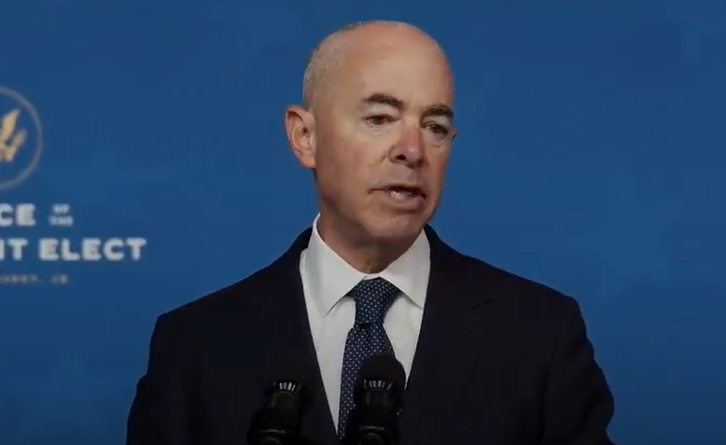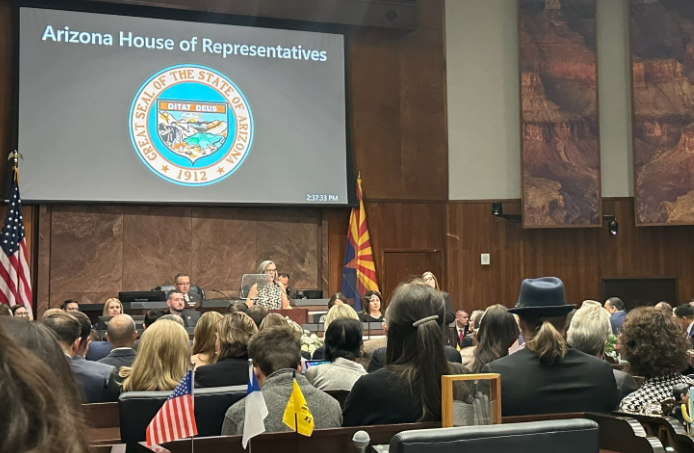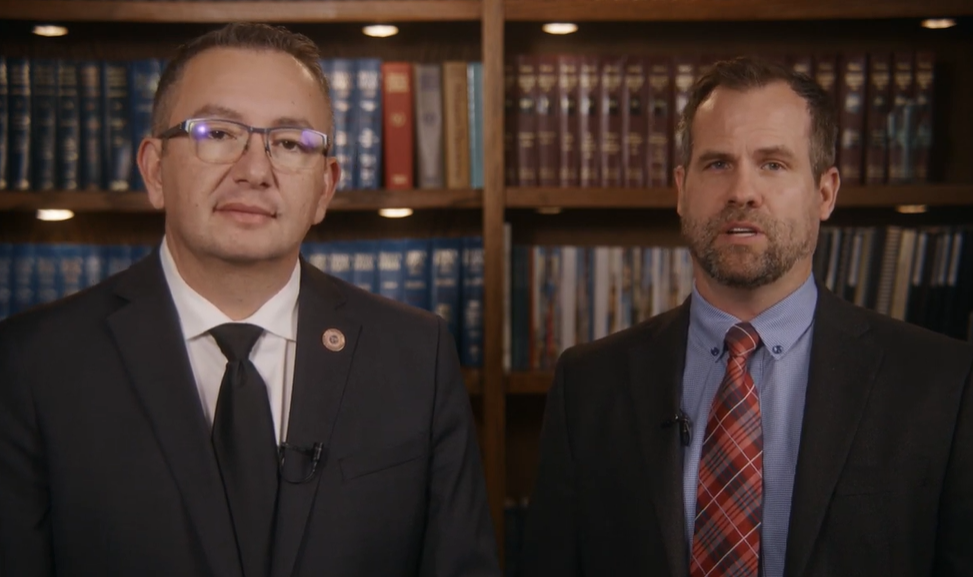
by Corinne Murdock | Jan 10, 2024 | News
By Corinne Murdock |
Arizona’s infamous instigator involved in the January 6 Capitol invasion, Ray Epps, was sentenced to a year-long probation and a $500 fine.
Epps appeared for sentencing virtually on Tuesday before Chief Judge James Boasberg. The judge expressed hope that the sentencing would allow Epps, a former Oath Keepers Arizona president, to move past the incident.
“[You were] vilified in a matter unique to January 6 defendants,” said Boasberg. “[You were] the only one who suffered for what you didn’t do.”
Contrary to allegations based on video evidence of Epps’ actions preceding and during the Capitol invasion, both Epps and the federal government have repeatedly denied that Epps has ever served as a federal employee, agent, or source.
“Mr. Epps […] was not before, during, or after [January 6, 2021] a confidential source or undercover agent working on behalf of the government, the FBI, or any law enforcement agency,” stated prosecutor Michael Gordon in a September plea hearing.
In a response to the government’s sentencing memo, issued on Sunday, Epps denied that he assisted in the breach of the capitol in any manner. Epps characterized himself as “stuck” in the crowd of protestors pushing against the fence line.
“[Epps] is the victim of a conspiracy theory, not the propagator of one,” stated the response.
Various video evidence of Epps shows him urging and directing protestors to breach the Capitol the day before and day of the invasion, as well as entering the Capitol grounds after the fence barrier was pushed over.
In one video, Epps said something in the ear of another protestor, Ryan Samsel; seconds later, Samsel led the charge to destroy the first set of Capitol barricades and breach the restricted grounds. The rioters then toppled a second set of barricades to further breach the restricted grounds. Epps followed behind the rioters in both breachings.
Samsel told the FBI that Epps told him to “relax” and that law enforcement was “doing their job.”
The government’s statement of offense, issued last September, documented Epps’ actions as well. That statement also revealed that Epps claimed in a text to a family member that he “orchestrated” the breaching.
Two days after the Capitol riot, Epps called the FBI tip line to turn himself in after seeing his face on a Most Wanted list. Several days after that, the Arizona Republic interviewed Epps; he told the outlet that he was advised by an attorney not to speak about the incident and that he “didn’t do anything wrong.”
Federal agents didn’t arrest Epps despite his admission to them and media outlets of his involvement: instead, they conducted a second interview with him that March. Several months later, in July, the FBI removed Epps from their Most Wanted list.
Prosecutors then waited over two years to charge Epps for his role in the Capitol invasion. He was charged with disorderly or disruptive conduct in a restricted building or grounds (Title 18 U.S. Code Section 1752(a)(2)). Epps pleaded guilty.
Epps told reporters in the summer of 2022 that he avoided arrest because he reached out to the FBI so quickly.
As of this report, Epps’ name wasn’t included in the D.C. Attorney’s Office list of the over 1,100 Capitol breach cases. Over 750 others have been sentenced so far.
11 other breachers arrested in Arizona were included on the list:
- Nathan Entrekin, sentenced to 45 days in prison, three years of probation, 60 hours of community service, and $500 fine;
- Andrew Hatley, sentenced to three years of probation and a $500 fine;
- Joshua Knowles, not yet sentenced;
- James McGrew, sentenced to six years and six months in prison, three years of supervised release, and $7,000 in fines;
- Felicia Konold, not yet sentenced;
- Edward Vallejo, sentenced to three years in prison, three years of supervised release, and one year of house arrest;
- Micajah Jackson, sentenced to three years of probation and $1,500 in fines;
- Jacob Anthony Chansley, sentenced to three years and five months in prison, three years of supervised release, and a $2,000 fine;
- Jacob Zerkle, not yet sentenced;
- Cory Konold, not yet sentenced; and
- Israel Mark Matson, not yet sentenced.
Corinne Murdock is a reporter for AZ Free News. Follow her latest on Twitter, or email tips to corinne@azfreenews.com.

by Elizabeth Troutman | Jan 10, 2024 | Economy, News
By Elizabeth Troutman |
Rep. David Schweikert, R-Ariz., urged Congress to “take our nation’s fiscal health seriously” in response to the growing national debt.
Schweikert’s Daily Debt Monitor shows the federal government’s gross national debt increasing by $839 billion already this fiscal year, which began in October.
“That’s ~$8.65 billion per day, and just over $100,000 per second,” Schweikert tweeted.
“I implore my brothers and sisters in Congress to take our nation’s fiscal health seriously,” the congressman continued.
The national debt has increased by more than $360 million per hour, $6 million per minute, and $100,00 per second this fiscal year.
The total national debt as of Jan. 4 was more than $34 trillion, compared to around $31 trillion on Jan. 4, 2023. This includes both intragovernmental and publicly held debt. Between 2023 and 2024, there was an increase in debt of more than $7 billion per day and $300 million per hour.
The national debt hit the $34 trillion record this month. The Congressional Budget Office’s January 2020 projections didn’t expect gross federal debt to surpass $34 trillion until fiscal year 2029.
The Congressional Budget Office expects the debt to only get worse in coming years. An estimate shows America’s entitlement spending, mandatory spending, and net interest payments on the debt will exceed the government’s total revenue by the early 2030s.
In June, Republican lawmakers and the White House agreed to temporarily lift the nation’s debt limit, making an agreement that lasts until January 2025.
The Congressional Budget Office estimated in its 30-year outlook last June that publicly held debt will be equal to a record 181% of American economic activity by 2053.
Elizabeth Troutman is a reporter for AZ Free News. You can send her news tips using this link.

by Elizabeth Troutman | Jan 10, 2024 | News
By Elizabeth Troutman |
Secretary of Homeland Security Alejandro Mayorkas “must be impeached immediately,” tweeted Rep. Juan Ciscomani, R-Ariz.
Ciscomani said he met with U.S. Customs and Border Protection (CBP) from Arizona to Texas, and they asked for policy changes to make it easier to minimize illegal crossings.
“Their top request is a policy change—consequences with the ability to detain & remove in order to deter,” Ciscomani said on Twitter. “But he’s[Mayorkas] not interested in giving them tools to tackle the crisis. His actions only worsen the situation.”
Ciscomani joined House Speaker Mike Johnson and more than 60 other House Republicans in a visit to the U.S.-Mexico border in Eagle Pass, Texas. The group met with CBP, attended a briefing with Texas Department of Public Safety, and joined a roundtable with local ranchers, business owners, and other local stakeholders, according to a news release.
Mayorkas told Bret Baier on Fox News that the Biden administration wants more money to process more illegal immigrants.
“Bret, the funds are needed to provide the Department of Homeland Security with more Border Patrol agents,” Mayorkas said. “The funds are needed to provide the Department of Homeland Security with more technology. The funds are needed to provide our department with more detention space to provide the Department of Justice with more immigration judges, so justice can be administered more swiftly.”
Border Patrol encountered 2.5 million migrants occurring in the U.S.-Mexico border in fiscal year 2023, topping the previous year’s record, according to the Migration Policy Institute.
The final month of the fiscal year saw 269,735 Border Patrol encounters at the Southwest border. This represents an 86% increase from encounters in June 2023.
“I believe in the American Dream that I’m living. But this [border crisis] is not it,” Ciscomani said at a press conference at the border. “With this crisis that Joe Biden and Alejandro Mayorkas created, nobody wins – except the cartels. They are the ones deciding who gets across and who doesn’t. They are the ones who are trafficking people and drugs. They are the ones terrorizing their own citizens, with no regard for human life.”
“The men and women we met with today, those fighting on the frontlines for our safety, are doing so with little to no support from this administration,” Ciscomani continued. “They are trying to enforce policies that are at best outdated or at worst, designed to fail.”
Elizabeth Troutman is a reporter for AZ Free News. You can send her news tips using this link.

by Corinne Murdock | Jan 9, 2024 | Education, News
By Corinne Murdock |
Gov. Katie Hobbs is claiming that the state’s school choice program is rife with abuse and in need of serious reform.
In her State of the State address on Monday, Hobbs claimed the Empowerment Scholarship Account (ESA) program lacks accountability and transparency, alluding to media reports of questionable and controversial expenditures — some of which were debunked previously.
“We have seen a steady stream of news coverage around unacceptable and sometimes downright outrageous use of taxpayer money under this program, including water park admissions, ski passes, and luxury car driving lessons,” said Hobbs.
The Arizona Department of Education (ADE) issues quarterly reports on the ESA program; the latest was released several days prior to Christmas. These reports include the program award amount received by students, as well as the number of orders and reimbursements approved and rejected.
ADE also provides lists of allowable and disallowable expenses, both updated last March. The ADE debunked one of Hobbs’ claims of “outrageous” expenditures last summer. In a statement, ADE clarified that it rejects expenditures for water park admissions.
An ABC15 review of 2022-23 ESA program expenditures found that ADE issued nearly 80 approvals for driving lessons and over 100 approvals for ski passes. However, that report didn’t distinguish whether those expenditures were made in 2022 under former ADE Superintendent of Public Instruction (SPI) Kathy Hoffman, or in 2023 under current SPI Tom Horne. The difference matters because, as Horne stated in November, similar “outlandish purchases” occurred under Hoffman, not him.
“Approvals like those came during the prior superintendent’s administration led by a friend of the leader of Save Our Schools, and one of my first acts in office was to put an end to it,” said Horne.
As reported by AZ Free News last January, Hoffman’s administration of the ESA program was described as neglectful and improper. In addition to severe understaffing and hundreds of thousands of unfulfilled expense requests, the Horne administration discovered questionable expense approvals such as espresso machines.
Hoffman’s administration of the ESA program has been something that Horne has pointed out repeatedly in refuting claims of improper ESA program expenditures.
“The frivolous ESA spending approvals occurred under the administration of the Governor’s friend, Kathy Hoffman,” said Horne in another statement last month.
As of Monday, over 73,200 students were in the ESA program.
Hobbs’ criticism of the ESA program comes days after she announced a plan to effectively dismantle the ESA program. Monday’s speech made mention of several aspects of this proposed plan: fingerprint background checks for private school educators, a new audit authority for the auditor general specific to monitoring ESA expenditures, and requirement of attendance at a public school for at least 100 days to qualify for the program.
The governor’s plan also aims to require private schools to accommodate Individualized Learning Plans and Section 504 Plans, prohibit private schools from increasing tuition costs at a rate higher than inflation, require private schools to meet certain education requirements, and require ADE to disclose which parental and student rights are waived upon entrance into the ESA program as well as graduation and chronic absenteeism rates.
At least one of Hobbs’ proposals addresses a practice already in place, according to Horne: accountability in the form of manual reviews of purchases over $500 and rejection of non-academic expenditures.
Horne explained in a statement that his staff reviews all expense requests, regardless of amount, leading to a rejection of over 12,000 purchase order requests and the suspension of nearly 2,200 accounts totaling $21 million due to public school enrollment.
“My job is to administer the ESA program in line with state law, and if changes are made, the Department of Education will follow them,” said Horne. “My office already reviews all expense requests regardless of amount, unlike the previous superintendent who approved many frivolous requests.”
That $500 threshold appears to be related to another false expenditure-related claim echoed by Hobbs from the activist group, Save Our Schools Arizona. The activist group implied in a viral post picked up by various media outlets that ADE approved an expenditure of over $500 for a Lego set.
“Contrary to a falsified document tweeted by Save Our Schools, no ESA parent has been reimbursed $500 to buy Legos,” said Horne. “To be clear, district, charter and ESA students are allowed to use Legos. The issue here is a pattern of lying. Save Our Schools admitted they fabricated a document to make it look like a parent made a $500 purchase when she did not. By doing so they have misled both the Governor and a prominent newspaper columnist, both of whom have retweeted this lie.”
Although the claim was debunked, Hobbs didn’t retract her viral accusation of ESA program mismanagement.
“Your taxpayer dollars are being used to buy $500 Lego sets because partisan politicians refuse to place limits on school vouchers,” said Hobbs.
Corinne Murdock is a reporter for AZ Free News. Follow her latest on Twitter, or email tips to corinne@azfreenews.com.

by Daniel Stefanski | Jan 9, 2024 | News
By Daniel Stefanski |
Arizona’s leading Republican lawmakers wasted no time in holding the state’s Democrat governor accountable on the first day of the Second Regular Session of the 56th Legislature.
On Monday, Arizona Governor Katie Hobbs delivered her second State of the State address, and the border crisis was the first theme she tackled in her speech to legislators and guests in the House chamber and gallery.
Hobbs blamed both “Democratic and Republican administrations” for “the failure to secure our southern border,” railing against “the same old political games that created this crisis and that have continually hurt communities, families, and our state.” The second-year governor asserted that she “delivered” on multiple fronts to help mitigate the crisis, including the launch of Operation SECURE and the creation of a Border Coordination Office within the Arizona Department of Homeland Security.
Both Senate President Warren Petersen and House Speaker Ben Toma reacted to the governor’s State of the State, releasing a joint video immediately after the conclusion of Hobbs’ remarks. The two men prioritized their response to this specific issue, dedicating almost two minutes of their five-minute video to discuss the governor’s record on border security. Toma argued that despite Hobbs’ attempt to make Arizonans “believe she’s all about securing our border and ending the lawlessness caused by Joe Biden’s immigration system…her record is one of open borders…and she’s continued that approach as governor.” The House Speaker alleged that “the governor’s reputation on immigration policy has only fueled this crisis.”
Petersen talked about “major mistakes” from Hobbs by vetoing three bills in particular “that would have kept families safe from drugs and crime.” Those 2023 bills, according to the Senate Republican leader, were HB 2675 (drug cartels, terrorist organizations; sponsored by Montenegro), HB 2469 (sovereign authority, border, health crisis; sponsored by Montenegro), and SB 1408 (electronic applications, human smuggling; sponsored by Wadsack). The East Valley lawmaker also noted that Hobbs “was a staunch critic of the shipping container barrier and advocated for its removal” at the border.
Toma also highlighted an instance when his colleagues “stopped (Hobbs’) irresponsible proposal of providing $40 million in state funding to pay for the college education of illegals in our state.”
During 2023, the first year of a rare, divided government in the Grand Canyon State, legislative Republicans effectively pointed out that the reality with the border crisis could have been more daunting for Arizonans if not for their check on Democrats. When Hobbs signed the state budget compromise in May, Petersen noted his members “prevented the Governor and Democrat Legislators from advancing their extremist agenda,” and promised “we’re not getting rid of state-funded border security resources to keep our communities safe.” Despite Hobbs’ efforts to be perceived as taking the border crisis seriously in the new year, she is unlikely to work with legislative Republicans on much – if any – fixes to help mitigate the lawlessness and consequences for affected communities.
Daniel Stefanski is a reporter for AZ Free News. You can send him news tips using this link.

by Daniel Stefanski | Jan 9, 2024 | News
By Daniel Stefanski |
The Arizona House Republican Caucus released its Majority Plan for the upcoming 2024 Legislative Session.
On Friday, Arizona House Majority Leader Leo Biasiucci posted his Caucus’ Majority Plan in advance of Monday’s session. Biasiucci wrote that “Arizona House Republican members will serve Arizonans once more by doing what we do best: defending past legislative victories and protecting our citizens’ fundamental rights.”
The House Republicans’ plan includes five pillars – border security, fiscal responsibility, good governance, education freedom, and constitutional rights.
On the border, House Republicans assured Arizonans that they could count on them “to again pursue meaningful policy and budgetary solutions in the upcoming legislative session to protect Arizona’s border,” including “empowering and supporting our county attorneys to prosecute egregious criminal activity, fighting fentanyl, combatting human trafficking, and engaging the Arizona National Guard.”
On fiscal responsibility, the Republicans cautioned that Arizona “must live within its means by reprioritizing discretionary funding and programs.” They pledged to “continue to put more money back in your pocket” and vowed to “pass a balanced budget that maintains Arizona’s competitive business and family-friendly economy.”
On good governance, the Majority Plan telegraphed Republicans’ intentions to be working on “election reforms in a deliberate manner aimed at fostering integrity and trust within our systems,” adding that ballot referendums would be likely on this front – especially in a divided government shared with Democrat Governor Katie Hobbs. House Republicans also stated their willingness to “remove barriers to entry, aid in cultivating a highly skilled new-blue-collar workforce, and tackle issues surrounding affordable housing,” in addition to continuing their efforts “to protect, prioritize, and secure water resources” for the future of Arizona.
On education freedom, House Republicans promised “to continue to protect school choice this year and beyond,” as well as supporting parental rights “to protect their children from vulgar and sexual material.”
On constitutional rights, the Republicans’ Plan assured Arizonans that their Caucus would “always protect rights guaranteed by the Constitution.” Throughout 2023, House Speaker Ben Toma and his Caucus had been extremely active in engaging in litigation to defend both state laws and cases in various federal courts. According to the 2024 Plan, those efforts will continue.
The House Republicans’ Plan for the 2024 Legislative Session follows the Senate Republicans’ Roadmap, which was released last month before Christmas. The Senate Republicans’ plan featured eleven categories for the upcoming session – budget approach, inflation relief, law enforcement & military, education, water, infrastructure, health, government, judiciary, elections, and litigation. They pledged to “remain laser focused on easing the burden of rising costs for our citizens, while continuing to stop dangerous California-style policies from being implemented in the Grand Canyon State,” adding their resolve to stay “unified in protecting freedoms and constitutional rights, advocating for family values and safe communities, promoting free market principles and limited government, and stopping radical ideologies from infiltrating the way of life and opportunities we’ve established over the past decade for all Arizonans.”
Daniel Stefanski is a reporter for AZ Free News. You can send him news tips using this link.






